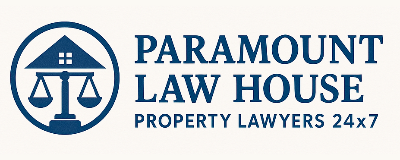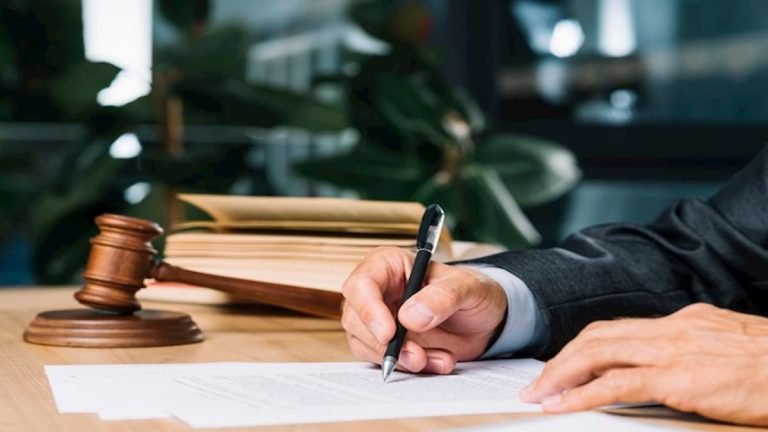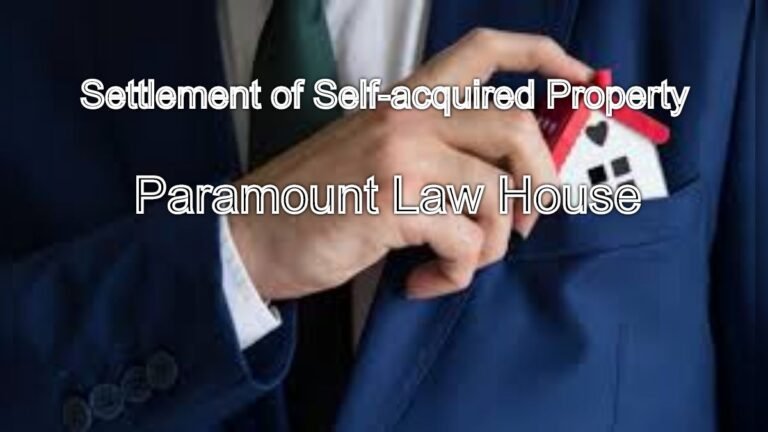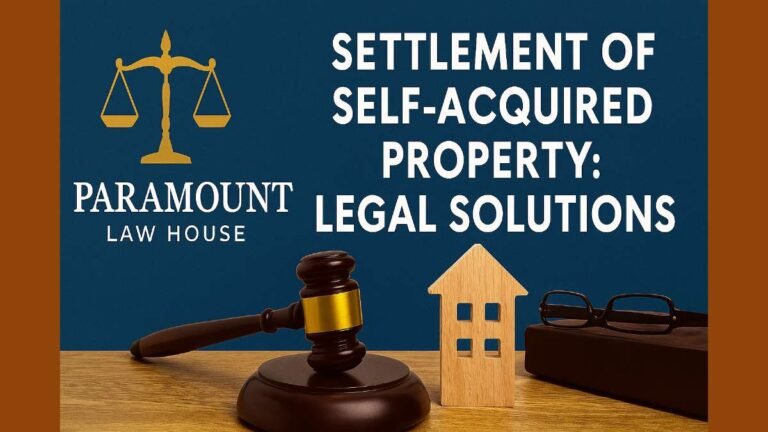Lease Deed Drafting: Ensure Legal Compliance
Lease Deed Drafting: Leasing property, whether residential or commercial, involves a complex legal process. A well-drafted lease deed is the cornerstone of…
Lease Deed Drafting: Leasing property, whether residential or commercial, involves a complex legal process. A well-drafted lease deed is the cornerstone of a successful landlord-tenant relationship. It clearly defines the rights and responsibilities of both parties, minimizing potential disputes and ensuring legal compliance. Paramount Law House, staffed by experienced property lawyers and real estate advocates, is available 24/7 to assist you with all your lease deed drafting needs. This article will delve into the intricacies of lease deed drafting, emphasizing the critical importance of legal compliance.
Lease Deed Drafting: Ensuring Legal Compliance: Paramount Law House
Understanding the Lease Deed
First and foremost, a lease deed, also known as a rental agreement or lease agreement, is a legally binding contract between a landlord (lessor) and a tenant (lessee). It grants the tenant exclusive possession of the property for a specified period, in exchange for regular rent payments. Consequently, the lease deed outlines the terms and conditions of the tenancy, including the duration, rent amount, payment schedule, security deposit, maintenance responsibilities, and termination clauses.
Furthermore, a comprehensive lease deed should address various contingencies, such as property damage, repairs, alterations, subletting, and dispute resolution. Therefore, it is crucial to have a professionally drafted lease deed that protects the interests of both the landlord and the tenant.
Essential Elements of a Legally Sound Lease Deed
To begin with, a valid lease deed must contain certain essential elements to be legally enforceable. These elements include:
- Identification of Parties: Clearly identify the landlord and the tenant, including their full legal names, addresses, and contact information.
- Description of the Property: Provide a detailed description of the leased property, including its address, size, and any specific features or amenities. Additionally, include details about any included fixtures or appliances.
- Term of the Lease: Specify the duration of the lease, including the start and end dates. Indicate whether the lease is fixed-term or periodic (e.g., month-to-month). Moreover, clarify the renewal process and any associated conditions.
- Rent and Payment Terms: Clearly state the rent amount, payment frequency (e.g., monthly, quarterly), due date, and acceptable payment methods. Also, specify any late payment fees or penalties. In addition, address the handling of rent increases and provide a clear mechanism for implementing them.
- Security Deposit: Outline the amount of the security deposit, the conditions under which it can be used (e.g., damage repair, unpaid rent), and the process for its return at the end of the tenancy. Furthermore, comply with local laws regarding security deposit limits and handling procedures.
- Maintenance and Repairs: Clearly define the responsibilities of the landlord and the tenant regarding property maintenance and repairs. Specify who is responsible for which types of repairs (e.g., structural repairs vs. minor repairs) and how repair requests should be handled.
- Use of the Property: Specify the permitted use of the property (e.g., residential, commercial). Also, outline any restrictions on activities that can be conducted on the premises.
- Termination Clause: Describe the conditions under which the lease can be terminated by either party, including notice requirements and any associated penalties. Additionally, address the process for handling abandoned property.
- Governing Law: Specify the governing law that will apply to the lease agreement.
Importance of Legal Compliance
Now, ensuring legal compliance is paramount in lease deed drafting. Lease agreements must adhere to all applicable local, state, and federal laws. These laws may cover various aspects of the tenancy, including rent control, eviction procedures, security deposit regulations, and fair housing practices.
Furthermore, non-compliance with these laws can lead to legal disputes, financial penalties, and even the invalidation of the lease agreement. Therefore, it is crucial to consult with experienced property lawyers who are well-versed in local and national real estate laws.
The Role of Paramount Law House
Consequently, Paramount Law House plays a crucial role in helping landlords and tenants navigate the complexities of lease deed drafting. Our team of experienced property lawyers and real estate advocates can provide comprehensive legal guidance and assistance, including:
- Drafting Lease Deeds: We can draft customized lease deeds that meet the specific needs and circumstances of both the landlord and the tenant, while ensuring full legal compliance.
- Reviewing Lease Deeds: We can review existing lease deeds to identify any potential legal issues or areas of concern.
- Negotiating Lease Terms: We can assist with negotiating favorable lease terms between landlords and tenants.
- Resolving Lease Disputes: We can represent clients in lease disputes, including eviction proceedings, breach of contract claims, and property damage disputes.
Additional Considerations
In addition, several other factors should be considered when drafting a lease deed. These include:
- Subletting: Clearly define the rules regarding subletting the property.
- Alterations: Specify the process for obtaining permission for any alterations to the property.
- Insurance: Outline the insurance requirements for both the landlord and the tenant.
- Indemnification: Include an indemnification clause to protect the landlord from liability for certain events.
- Dispute Resolution: Specify the method for resolving disputes, such as mediation or arbitration.
FAQs: Lease Deed Drafting
A lease deed is a legally binding contract between a landlord (lessor) and a tenant (lessee) that grants the tenant exclusive possession of a property for a specific period in exchange for rent. It outlines the terms and conditions of the tenancy, including rent, duration, responsibilities, and termination clauses. A well-drafted lease deed is crucial because it protects the interests of both parties, minimizes potential disputes, and ensures legal compliance.
A valid lease deed must include: identification of parties (landlord and tenant); a detailed property description; the lease term (start and end dates); rent amount and payment terms; security deposit details; maintenance and repair responsibilities; permitted use of the property; termination clause; and governing law.
Legal compliance is paramount because lease agreements must adhere to all applicable local, state, and federal laws. These laws cover various aspects of tenancy, such as rent control, eviction procedures, security deposit regulations, and fair housing practices. Non-compliance can lead to legal disputes, financial penalties, and even the invalidation of the lease.
A property lawyer can provide invaluable assistance in lease deed drafting. They can draft customized lease deeds that meet the specific needs of both parties while ensuring full legal compliance. They can also review existing lease deeds, negotiate lease terms, and represent clients in lease disputes. Their expertise helps avoid legal pitfalls and ensures a smooth tenancy.
Beyond the essential elements, a comprehensive lease deed should also address subletting rules, procedures for property alterations, insurance requirements for both parties, indemnification clauses to protect the landlord, and a specified method for dispute resolution (e.g., mediation or arbitration). These additional considerations contribute to a more thorough and protective agreement.
Conclusion
To summarize, a well-drafted lease deed is essential for a successful landlord-tenant relationship. It protects the interests of both parties and minimizes the risk of legal disputes. Paramount Law House, with its team of experienced property lawyers and real estate advocates, is dedicated to providing comprehensive legal services in all aspects of lease deed drafting. Contact us today for expert guidance and ensure legal compliance in your lease agreements. We are available 24/7 to serve your needs. Ultimately, a legally sound lease deed is an investment in a smooth and legally compliant tenancy.






